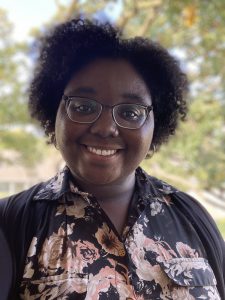
We interviewed school psychology PhD student Alexandria Robers about her research interests and her journey to the Department of Educational Psychology.
What are your research interests?
My research interests involve improving equitable discipline practices in schools. This includes identifying effective methods for supporting the behavioral health of culturally and linguistically diverse students to minimize the occurrence of classroom exclusionary discipline practices. Currently, I am focused on how we can leverage classroom behavior management interventions to reduce the occurrence of teacher-delivered exclusionary discipline practices.
How did your path lead to the Department of Educational Psychology and your particular major?
I discovered the field of school psychology during my last year of undergraduate study. At the beginning of November of that year, I found out about the school psychology program at the U. A week later, I took the GRE. Then, by the middle of November, I had to submit my final application materials and thankfully everything was received on time. After my first year of graduate school, I learned about applied behavior analysis and decided to pursue a degree in that program as well. So, I’m currently enrolled in both the school psychology and applied behavior analysis programs.
What surprised you along the way?
The overall camaraderie of my programs and the resultant friendships that I have acquired throughout my time in graduate school is something I did not expect to experience along the way of pursuing my graduate degrees.
What is something you’ve most enjoyed about your experience?
During my graduate experience, I’ve most enjoyed connecting with faculty who are truly experts in their fields. Whether attending national conferences or contributing to academic Twitter, I can tell that the knowledge and experiences that I’m gaining are cutting-edge in the field of school psychology.
What is most exciting about your work?
The most exciting aspect of my work is being prepared to solve problems that get in the way of children’s learning and overall functioning in and out of school.
How would you describe the student experience, and what does that mean to you?
The student experience means that you are in a unique position to ask as many questions as you want and seek out as many opportunities as you need to learn and grow as a scholar. What this means to me is that I am able to learn and grow without having all of the responsibility associated with someone who has a bunch of initials after their name (i.e., PhD, LP, NCSP, BCBA).
What has been most challenging?
The most challenging aspect of this experience for me has been knowing how to prioritize which opportunities to take advantage of. As a student, there are various opportunities offered to you and it can feel overwhelming at times deciding which to pursue and which to decline.
How have your professors helped you along the way?
My professors have provided me with the time and space to discuss my future career and professionals goals. As someone who struggled with the decision to pursue a job in academia versus practice, these conversations with my professors were essential in helping me clarify and finalize my future goals.
What would you like prospective students to know?
Be prepared to work hard and do your best but know that everyone here wants you to succeed.
How has your cohort helped you along the way?
I’m sure a lot of people share this sentiment, but I truly believe that I have the best cohort in the world. The social support I’ve received from this group of young women is unparalleled to anything I’ve ever experienced before. I truly do not think I would have made it this far without them.
What are you looking forward to with graduation?
Getting hooded by my advisor and having the ‘Dr.’ salutation on my credit card.
How do you plan to use what you are learning/your degree?
I plan to go into academia and continue to push both of my fields forward with the ultimate goal to begin merging the fields of school psychology and applied behavior analysis.
Why did you choose the school psychology program at the University of Minnesota?
I chose the school psychology program at the University of Minnesota because I wanted to work with faculty who were productive in moving the field forward and developing alumni who were movers and shakers in the field.



